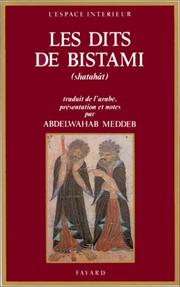| Listing 1 - 3 of 3 |
Sort by
|

ISBN: 2213023824 9782213023823 Year: 1989 Publisher: Paris: Fayard,
Abstract | Keywords | Export | Availability | Bookmark
 Loading...
Loading...Choose an application
- Reference Manager
- EndNote
- RefWorks (Direct export to RefWorks)
Soufisme. --- Sufi literature --- Sufi literature, Arabic. --- Sufi literature. --- Sufism. --- Sufism. --- Sufismo --- Obras anteriores a 1800. --- Abū Yazīd Bisṭāmī, Ṭayfūr ibn ʻĪsá, --- Iran.
Book
ISBN: 9780415419437 0415419433 9780415426237 0415426235 9780415426244 0415426243 9780415426251 0415426251 9780415426268 041542626X Year: 2008 Volume: *12 Publisher: London ; New York Routledge
Abstract | Keywords | Export | Availability | Bookmark
 Loading...
Loading...Choose an application
- Reference Manager
- EndNote
- RefWorks (Direct export to RefWorks)
Sufism. --- origins and development of Sufism --- Sufi lterature --- asceticism --- mysticism --- Ibn Hanbal --- Bishr al-Hafi --- As-Sulami --- Sufi women --- the Karramiyya --- Hakim Tirmidhi --- Junayd --- Sufi organizations --- Nishapur --- Sufi orders --- Visio Smaragdina --- Uways al-Qarani --- the Uwaysi Sufis --- the Malamati movement --- Abu Yazid --- the Mi'raj --- Sufi traditions of South Asia --- Jami --- five divine presences --- Sino-Muslims --- Ishraq --- Wahda --- anti-Sufism --- Safavid Iran --- Yoga --- femininity --- Islamic mysticism --- gender --- spirituality --- Islamic Sufi orders --- the Sufi intellectual tradition --- doctrines --- Sama' --- ritual --- praying --- devotion --- Egyptian Sufism --- Muslim saints --- postmodernism --- Javanmardi --- Sufi authority --- Khatami --- Khayyam --- Alevilik --- neo-Sufism --- the Sudanese Mahdi --- modern Islam --- the Nakshibendi order of Turkey --- Allah --- the Hui --- Islam and the state --- the Indonesian Islamic revival --- Tijani doctrines --- charisma --- Somaliland --- Islamization --- 'Irfan
Book
ISBN: 069105584X 1322018529 0691605440 0691634416 1400861969 Year: 1991 Publisher: Princeton, New Jersey : Princeton University Press,
Abstract | Keywords | Export | Availability | Bookmark
 Loading...
Loading...Choose an application
- Reference Manager
- EndNote
- RefWorks (Direct export to RefWorks)
Waqfs, or religious endowments, have long been at the very center of daily Islamic life, establishing religious, cultural, and welfare institutions and serving as a legal means to keep family property intact through several generations. In this book R. D. McChesney focuses on the major Muslim shrine at Balkh--once a flourishing city on an ancient trade route in what is now northern Afghanistan--and provides a detailed study of the political, economic, and social conditions that influenced, and were influenced by, the development of a single religious endowment. From its founding in 1480 until 1889, when the Afghan government took control of it, the waqf at Balkh was a formidable economic force in a financially dynamic region, particularly during those times when the endowment's sacred character and the tax privileges it acquired gave its managers considerable financial security. This study sheds new light on the legal institution of waqf within Muslim society and on how political conditions affected the development of socio-religious institutions throughout Central Asia over a period of four hundred years.Originally published in 1991.The Princeton Legacy Library uses the latest print-on-demand technology to again make available previously out-of-print books from the distinguished backlist of Princeton University Press. These editions preserve the original texts of these important books while presenting them in durable paperback and hardcover editions. The goal of the Princeton Legacy Library is to vastly increase access to the rich scholarly heritage found in the thousands of books published by Princeton University Press since its founding in 1905.
Charitable uses, trusts, and foundations --- Islamic shrines --- Fondations (Droit) --- History --- Histoire --- Mazar-e Sharif (Afghanistan) --- Mazare e Sharif (Afghanistan) --- History. --- Mazār-i Sharīf (Afghanistan) --- Muslim shrines --- Shrines --- Charitable remainder trusts --- Donations --- Endowments --- Charities --- Charity laws and legislation --- Juristic persons --- Trusts and trustees --- Uses (Law) --- Charitable bequests --- Law and legislation --- Mazār-e Sharīf (Afghanistan) --- Mazār-e Sharīf, Afghanistan --- Mazār Sharīf (Afghanistan) --- Mazari Sharif (Afghanistan) --- Abbasid Caliphate. --- Abd Al-Rahman. --- Abd al-Mu'min. --- Abu Bakr. --- Abu Talib ibn Abd al-Muttalib. --- Abu Yazid. --- Abu Yusuf. --- Abu'l-Khayr Khan. --- Ahab. --- Ahl al-Bayt. --- Ahmad Shah. --- Al-Ghazali. --- Al-Qastallani. --- Al-Shahrastani. --- Ali Mardan Khan. --- Appanage. --- Aqsaqal. --- Ardabil. --- Ashraf Ghani. --- Atabeg. --- Badakhshan. --- Bahram (Shahnameh). --- Balkh. --- Banna'i. --- Battle of Khaybar. --- Bayazid Bastami. --- Bukhara. --- Caliphate. --- Central Asia. --- Central Authority. --- Dastur al-Muluk. --- Deployment plan. --- Dushanbe. --- Emirate. --- Foreign policy. --- Hanafi. --- Hegira. --- Herat. --- Hulagu Khan. --- Ibn Battuta. --- Ishmael in Islam. --- Iskandar (Timurid dynasty). --- Islam. --- Islamic culture. --- Islamic state. --- Ja'far al-Sadiq. --- Kandahar. --- Karbala. --- Kashgar. --- Khagan. --- Khan (title). --- Khanate. --- Khaybar. --- Khoja (Turkestan). --- Kipchaks. --- Majlis. --- Maoism. --- Mazar-i-Sharif. --- Mihrab. --- Mufti. --- Muhammad Akram. --- Muhammad Ishaq. --- Muhammad Khan (Ilkhan). --- Muhammad Salih. --- Muhammad al-Baqir. --- Muhammad al-Shaybani. --- Muhammad of Ghor. --- Mukhayriq. --- Murad Bakhsh. --- Naqshbandi. --- Oedipus complex. --- Qadi. --- Rabi' al-awwal. --- Rustam (Haqqani network). --- Safavid dynasty. --- Sahabah. --- Samarkand. --- Sayyid. --- Shafi'i. --- Shah Jahan. --- Shahnameh. --- Shahrbanu. --- Shams al-Din Muhammad. --- Sheikh. --- Shia Islam. --- Shrine of Ali. --- Sufism. --- Syncretism. --- Tariqa. --- Timur. --- Transoxiana. --- Turkistan (city). --- Umayyad Caliphate. --- Uthman. --- Uzbek language. --- Uzbeks. --- Waqf. --- Yaqut al-Hamawi. --- Zaidiyyah. --- Zakat. --- Mazar-i Sharif (Afghanistan)
| Listing 1 - 3 of 3 |
Sort by
|

 Search
Search Feedback
Feedback About UniCat
About UniCat  Help
Help News
News